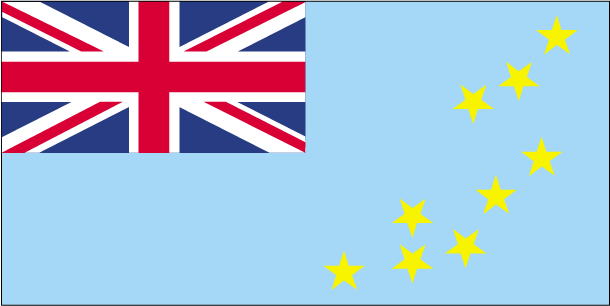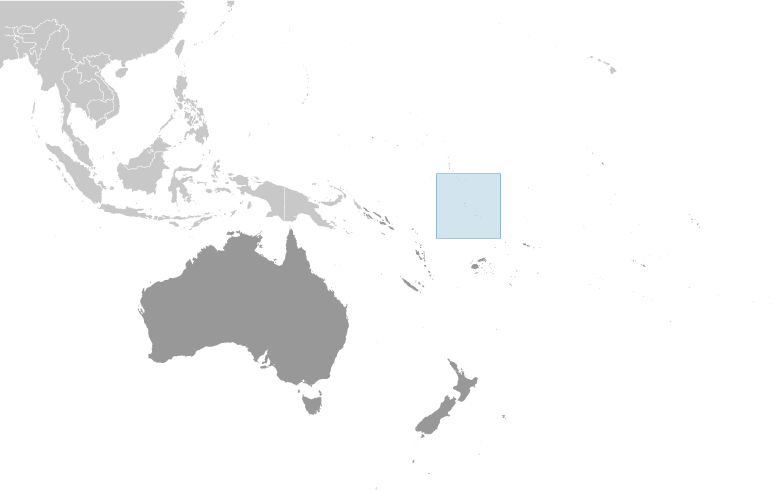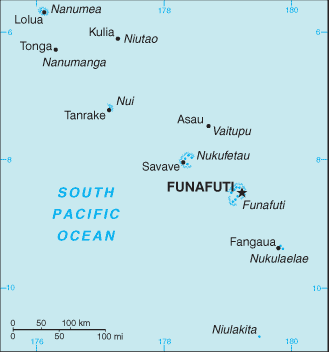In 1974, ethnic differences within the British colony of the Gilbert and Ellice Islands caused the Polynesians of the Ellice Islands to vote for separation from the Micronesians of the Gilbert Islands. The following year, the Ellice Islands became the separate British colony of Tuvalu. Independence was granted in 1978. In 2000, Tuvalu negotiated a contract leasing its Internet domain name ".tv" for $50 million in royalties over a 12-year period.
Locaion
Oceania, island group consisting of nine coral atolls in the South Pacific Ocean, about one-half of the way from Hawaii to Australia
Geographic Co ordinates
8 00 S, 178 00 E
Land Boundries
0 km
Geography - note
one of the smallest and most remote countries on Earth; six of the nine coral atolls - Nanumea, Nui, Vaitupu, Nukufetau, Funafuti, and Nukulaelae - have lagoons open to the ocean; Nanumaya and Niutao have landlocked lagoons; Niulakita does not have a lagoon
Population
10,472 (July 2010 est.)
Country comparison to the world:224
Nationality
Noun:Tuvaluan(s)
Adjective:Tuvaluan
Ethnic groups
Polynesian 96%, Micronesian 4%
Religions
Church of Tuvalu (Congregationalist) 97%, Seventh-Day Adventist 1.4%, Baha'i 1%, other 0.6%
Languages
Tuvaluan, English, Samoan, Kiribati (on the island of Nui)
Country Name
Conventional long form:none
Conventional short form:Tuvalu
Local long form:none
Local short form:Tuvalu
Former:Ellice Islands
note: "Tuvalu" means "group of eight" referring to the country's eight traditionally inhabited islands
Government Type
parliamentary democracy and a Commonwealth realm
Capital
Name:Funafuti
Geographic coordinates:8 30 S, 179 12 E
Time difference:UTC+12 (17 hours ahead of Washington, DC during Standard Time)
note: administrative offices are in Vaiaku Village on Fongafale Islet
Administrative divisions
none
Independence
1 October 1978 (from the UK)
National Holiday
Independence Day, 1 October (1978)
Constitution
1 October 1978
Legal system
English common law supplemented by local customary law
Suffrage
18 years of age; universal
Executive branch
Chief of state:Queen ELIZABETH II (since 6 February 1952); represented by Governor General Filoimea TELITO (since 15 April 2005)
Head of government:Prime Minister Apisai IELEMIA (since 14 August 2006)
Cabinet:Cabinet appointed by the governor general on the recommendation of the prime minister
(For more information visit the World Leaders website)
Elections:the monarchy is hereditary; governor general appointed by the monarch on the recommendation of the prime minister; prime minister and deputy prime minister elected by and from the members of parliament; election last held on 14 August 2006 (next to be held following parliamentary elections in 2010)
Election results:Apisai IELEMIA elected prime minister in a parliamentary election on 14 August 2006
Legislative branch
unicameral Parliament or Fale I Fono, also called House of Assembly (15 seats; members elected by popular vote to serve four-year terms)
Elections:last held on 3 August 2006 (next to be held in 2010)
Election results:percent of vote - NA; seats - independents 15
Judicial branch
High Court (a chief justice visits twice a year to preside over its sessions; its rulings can be appealed to the Court of Appeal in Fiji); eight Island Courts (with limited jurisdiction)
Political Parties and Leaders
there are no political parties but members of parliament usually align themselves in informal groupings
Political pressure groups and leaders
none
International organization participation
ACP, ADB, AOSIS, C, FAO, IFRCS (observer), ILO, IMO, IOC, ITU, OPCW, PIF, Sparteca, SPC, UN, UNCTAD, UNESCO, UPU, WHO
Diplomatic representation in the US
Tuvalu does not have an embassy in the US - the country's only diplomatic post is in Fiji - Tuvalu does, however, have a UN office located at 800 2nd Avenue, Suite 400D, New York, NY 10017, telephone: [1] (212) 490-0534
Diplomatic representation from the US
the US does not have an embassy in Tuvalu; the US ambassador to Fiji is accredited to Tuvalu
Flag description
light blue with the flag of the UK in the upper hoist-side quadrant; the outer half of the flag represents a map of the country with nine yellow five-pointed stars symbolizing the nine islands










